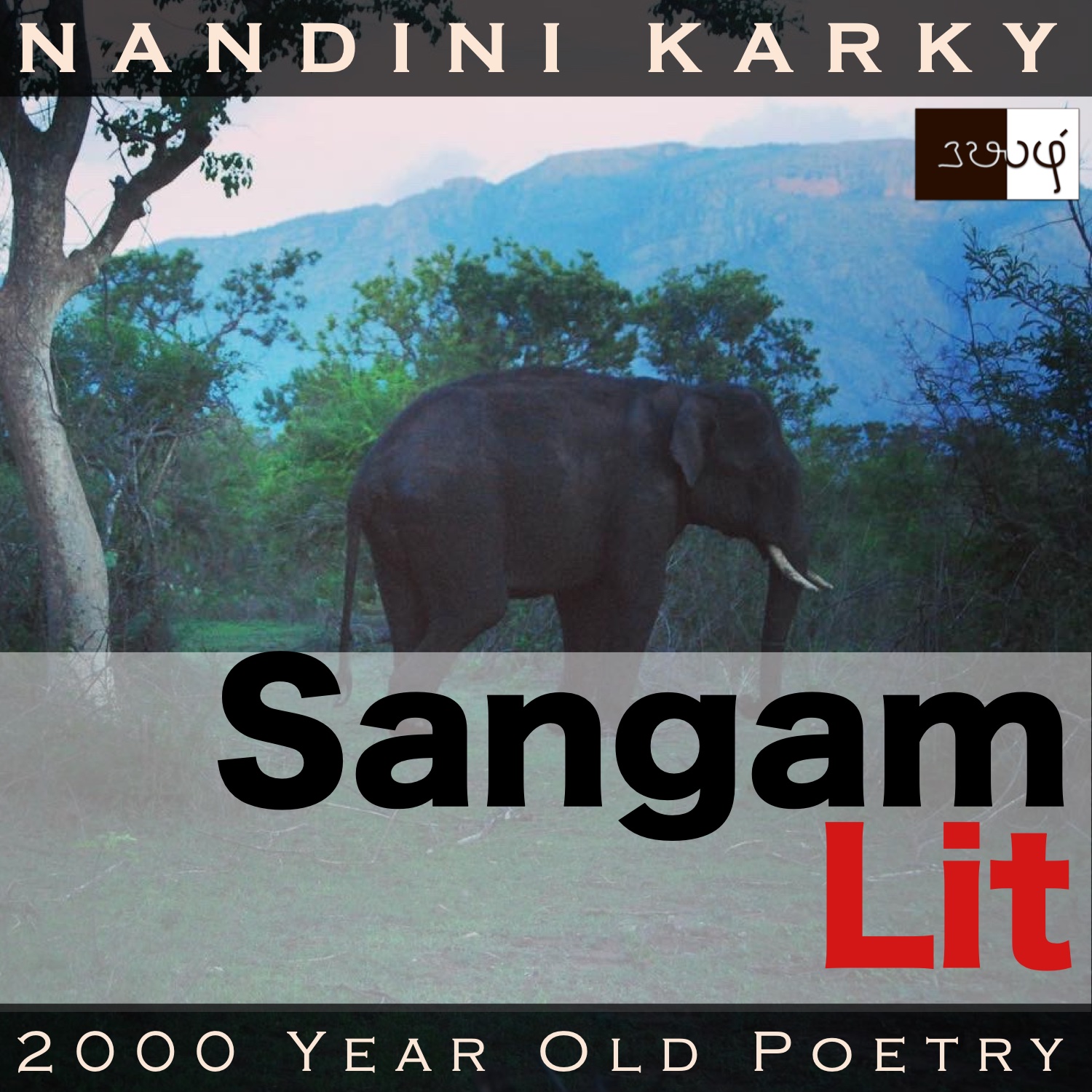Podcast: Play in new window | Download
Subscribe: Apple Podcasts | Spotify | Amazon Music | Android | iHeartRadio | Email | TuneIn | RSS | More

In this episode, we perceive how a person reads the heart of another, as portrayed in Sangam Literary work, Kurunthogai 346, penned by Vaayil Ilankannanaar. Set in the mountains of ‘Kurinji’, the verse speaks in the voice of the confidante to the lady, subtly persuading her to tryst with the man by night.
நாகு பிடி நயந்த முளைக்கோட்டு இளங்களிறு
குன்றம் நண்ணி குறவர் ஆர்ப்ப,
மன்றம் போழும் நாடன் தோழி,
சுனைப் பூங்குவளைத் தொடலை தந்தும்,
தினைப் புன மருங்கில் படுகிளி ஓப்பியும்,
காலை வந்து, மாலைப் பொழுதில்
நல் அகம் நயந்து, தான் உயங்கிச்
சொல்லவும் ஆகாது அஃகியோனே.
The verse is all about ‘an unsaid wish’! In the opening words ‘நாகு பிடி நயந்த முளைக்கோட்டு இளங்களிறு’ meaning ‘a young male elephant with a tusk akin to a bamboo shoot, desiring a young female’, we see an apt comparison between an elephant’s white tusk and a bamboo shoot, linking the plant and animal world through this word bridge, something Sangam poets were well-skilled in. An object of art and beauty can be seen in ‘சுனைப் பூங்குவளைத் தொடலை’ meaning ‘a flower garland made of lilies blooming in the springs’. The phrase ‘படுகிளி ஓப்பியும்’ meaning ‘chasing away parrots’ brings to fore, the predominant occupation of Sangam women in the mountains. The core theme of a wish is echoed in the words ‘நல் அகம் நயந்து’ meaning ‘wishing in that good heart’. Ending with the words ‘சொல்லவும் ஆகாது அஃகியோனே’ meaning ‘not saying anything, he becomes helpless’, the verse invites us to learn more.
What could be the yearning in that good heart? The context reveals that the man and lady were leading a love relationship and that the man was trysting with the lady by day. One day thereafter, the confidante comes to the lady and says, “Desiring the young, female elephant, the young male with a bamboo-shoot tusk reaches the hills. When mountain dwellers cry aloud, the male tusker rushes to the village centre in the land of the lord, my friend. To give you garlands of lilies from the springs and drive away stealing parrots in the millet fields, he arrives in the morning. In the evening, desiring something in his good heart, unable to say it aloud, he suffers with an unfulfilled wish!” With these words, the confidante informs the lady of the man’s desire to tryst with the lady by night and subtly persuades her to accept that request.
Time to delve into the nuances. The confidante starts with the description of the man’s land by mentioning how a young male elephant, desirous of meeting its female arrives to the peaks. Seeing it, the mountain men start making loud noises. Startled by this, the young male runs towards the village centre of the man’s domain, the confidante continues. After denoting the man’s address, she moves on to his recent activities of weaving garlands out of freshly plucked lilies from mountain springs and how he stood side by side with the lady and helped her in her task of chasing away parrots from the millet fields. While these are the activities by day, as night falls, he seems to become crestfallen, with some desire nagging his heart, and yet, he doesn’t talk about it, and leaves in a dejected manner, the confidante concludes.
In the image of the elephant running towards the village centre, lies the metaphor for the man’s intention to arrive by the lady’s house at night so as to tryst with her. By talking of his good heart and the way he doesn’t openly ask anything, the confidante does an excellent job of painting a glowing picture of the man’s gentle nature. This certainly brings positivity to the man’s personality. This is because he is seen as not demanding or even requesting a tryst with the lady, but only wishing quietly within. What impresses me in this little verse is the way the heart of another is interpreted from their gestures and actions. When such an unsaid but dear wish is granted, imagine the joy of the one who receives it. Understanding the unspoken is truly a special power of the human mind – one that rises beyond the obvious and sees deeply into the heart of another!




Share your thoughts...